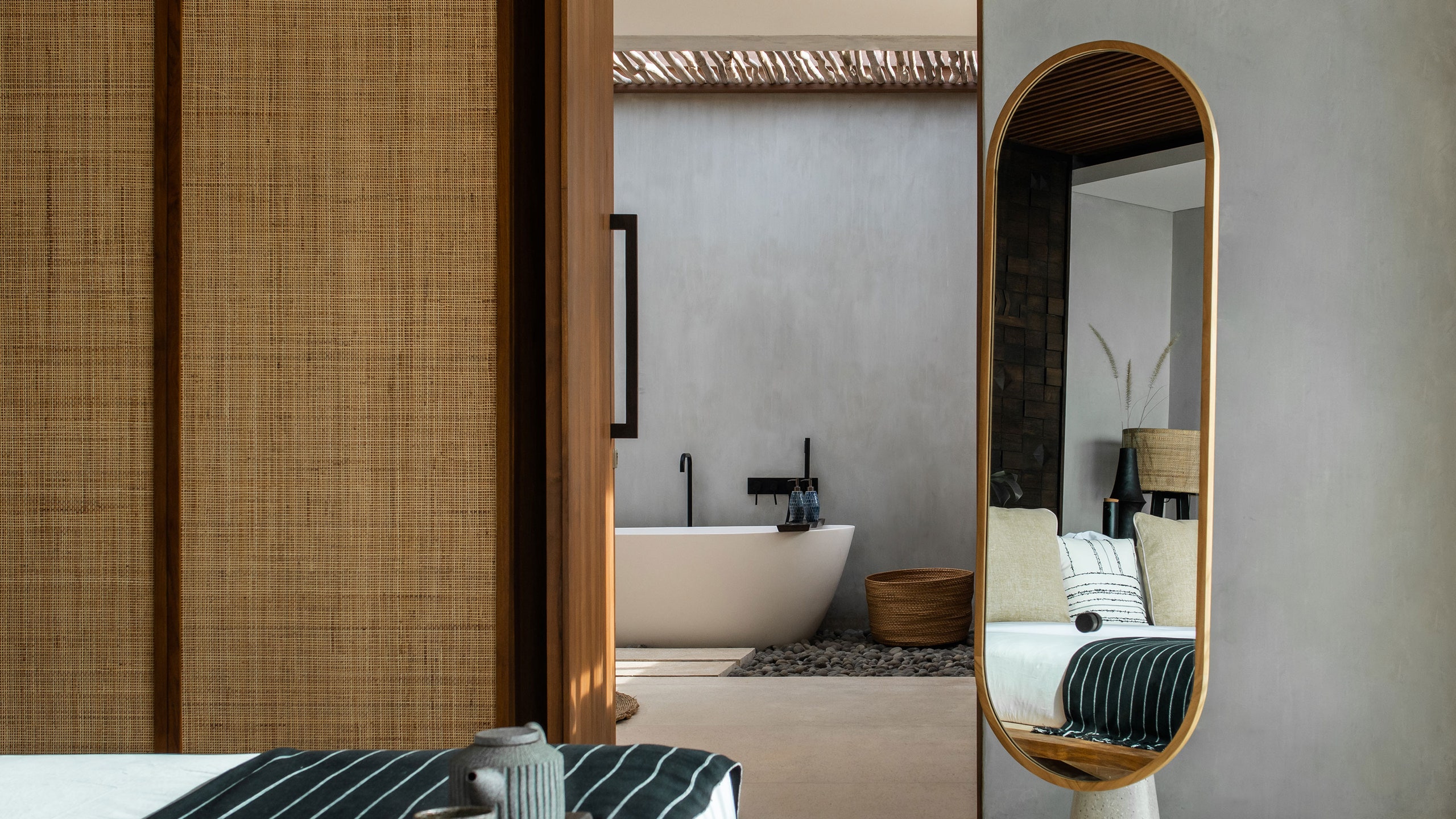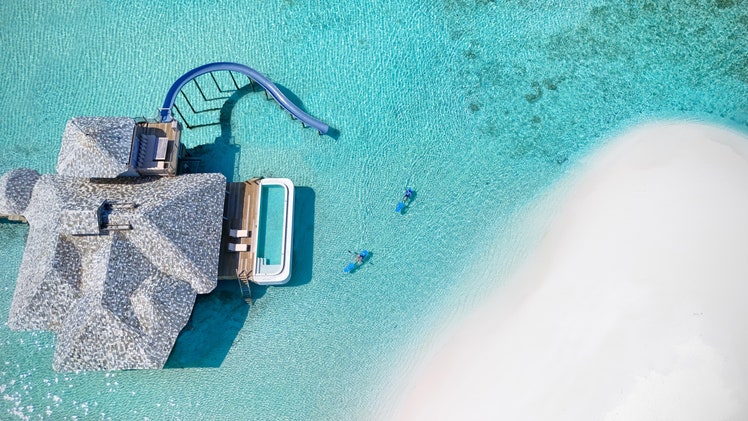Review: Cap Karoso
Photos














Why book Cap Karoso, Sumba?
Christopher Burch’s trailblazing Nihi Sumba resort put the rugged Indonesian island of Sumba on the global jet-setters’ map when it launched in 2001, but recent years have seen a slew of new resorts open their doors. Cap Karoso, on Sumba’s remote western tip, is among the most ambitious (and anticipated) additions and shares a wilder side of Sumba few visitors have seen before. The resort’s sleek design and facilities make for a brilliant beach break with a heavy helping of local culture.
Set the scene
Forget what you know about Indonesia if Bali is your reference: Sumba, three islands to Bali’s east and roughly twice its size, is a totally different beast. There are no finely-wrought temples here, nor is there much to find in terms of restaurants or other entertainment. This is the territory of spear-throwing warriors and ancestral spirits, who dwell in thatch-roofed uma mbatangu homes that seemingly haven’t changed for centuries. It makes Cap Karoso, with its concrete-clad and straight-lined structures trundling down a sloping hill on Karoso Beach, an odd one out. Eschewing the somewhat trope-y ikat tapestries and high-pitched alang grass roofs, the resort carved out a wholly fresh look by consciously reinterpreting the island’s rich craft heritage through a Gallic lens: pierre sèche drystone walls from local limestone, abstract works by French-Indonesian artist Ines Katamso, and glazed tile work inspired by local wicker. The result is, quite possibly, the loveliest island retreat on this side of the Wallace Line, where lazy days flow from pool-lolling at the breezy beach club to jaunts around turquoise lagoons to peachy pink sunsets with sandalwood-spiked Negroni around the rooftop infinity pool.
The backstory
A sabbatical around Spain, the Maldives, Norway and Bali, followed by a string of serendipitous encounters, brought Cap Karoso’s Parisian owners, Evguenia and Fabrice Ivara, to this rugged corner of Sumba in 2017. It rained, there were hardly any roads, and there was not a single hotel nearby – but still, the couple felt a calling to this barren plot of land facing the vast nothingness of the Indian Ocean. They took an all-or-nothing leap and embarked on an all-consuming construction project that’d take more than five years, overcoming numerous roadblocks and miles of red tape along the way. Despite the challenges, they were adamant there’d be no compromises. It shows: Evguenia drew on her experience as a marketer at LVMH to customise everything from the furniture and bathroom toiletries (made in collaboration with French master perfumer Gerard Gatti) to the ikat-inspired ceramic cups by Bali-based Gaya Ceramics and bespoke oolong tea blends by Indonesian tea brand TEMA.
The rooms
Cap Karoso’s two-story main building is home to the lion’s share of the rooms – breezy studios with creamy terrazzo floors, snug ocean-facing balconies and gorgeous hand-carved wooden headboards with ikat-like patterns. Studios in the plant-draped wings closer to the beach come with their own sun-dappled terrace and feature the same tropic-tinged modernist furniture. The stand-alone suites feel like mini-villas with their spacious throw-the-doors-open living room, private terrace and semi-open bathroom with pebble floors – all ensconced in tropical waterfront gardens. At the time of my visit in July, the hotel was in its soft-opening phase, and construction of the 20 villas was still in full swing. When they open in 2023, they’ll deliver heaps of private space (up to three bedrooms), glass-walled living rooms and lagoon pools with dazzling ocean views.
Food and drink
Given the couple’s gourmand roots (Fabrice runs a well-respected food blog, and Evguenia worked for Dom Pérignon), the resort’s bars and restaurants are predictably top-notch. At the beach club, the breakfast menu is a pick-and-mix of French and Indonesian classics—cloud-like goat cheese omelette soufflées, sambal-spiked nasi goreng, and charcuterie with jambon hand-carried from Paris–while lazy lunches feature farm salads, fresh pasta, and pizzas from a real-deal Neapolitan oven. Jutting out from the main building at the top of the lot is Apicine, where guests gather for inspired cocktails from local bounty (think coconut fat-washed gin and papaya spritzes) during sunset. The showstopper, however, is nearby Julang. At this 20-seat fine diner, a rotating roster of global chefs drops in for weeks-long residencies, where they cook with ingredients from the resort’s sprawling organic farm. Previous pop-ups have welcomed Scott Stevenson of Melbourne’s MoVida and Champagne-based chef couple Gil Nogueira and Sayaka Sawaguchi.
The spa
Set up as a small village of typically Sumbanese dwellings, all with stilted floors and sombrero-like roofs covered in alang-alang thatch, the Malala Spa draws on local healing herbs and rituals for its treatment menu. There are muscle-melting rubdowns with indigenous white sandalwood oil, turmeric and noni fruit and exfoliating salt scrub sessions with seaweed baths, plus a deeply spiritual treatment derived from the local Marapu religion, which uses oil from the root of a tree found only in a single forest on the island.
The neighborhood/area
As Sumbanese as it gets. While tourism has already left a mark on some of the island’s more developed corners, Cap Karoso’s Kodi district (about an hour south of Tambolaka airport) in Sumba’s southwest still feels virtually untouched. The Ivaras like to keep it that way: they work closely with a handful of nearby villages for guided tours but keep their visitor numbers limited and guests well-informed of the deep-rooted local customs. This means these excursions feel respectful, unimposing, and more like a mutual cultural exchange than a Disneyfied flying visit. Kodi is also home to some of Sumba’s postcard sights, including the crystalline Waikuri Lagoon and rugged rock formations of Mandorak Beach, which are reachable via a guided half-day trip or as a DIY excursion on the resort’s e-bikes.
The service
A true delight. Trained and managed by a small group of (primarily French) chefs and hoteliers, the young and predominantly Sumbanese team members are a chirpy bunch. They’re remarkably confident, easygoing and eager to please, but also endearingly unafraid to admit they’re still honing their skills–my airport transfer with a young local guide and driver turned, as per their request, into an impromptu English lesson. Clearly empowered to teach guests about their culture, they provide a rich source of local intel and fascinating anecdotes.
Who comes here
All kinds of global sophisticates – from linen-wearing young families seemingly plucked from the pages of a sales brochure to Bali’s expatriate old-timers and loved-up honeymooners on jaunts around Asia.
For families
A kids club is still in the works and slated to open later this year, but even without one, this is a pretty perfect playground for little ones. There are shallow areas in the pool, toys in the beach club, and miles of sand without anyone in sight. Babysitters are on call if parents want to nip out for private time.
Eco effort
The resort keeps operations as local as possible, from its organic farm supplying fresh vegetables to the kitchen to hiring underprivileged youths through the Sumba Hospitality Foundation, a Belgian-run NGO and highly respected hospitality school based in Tambolaka. Water is treated on-property, and most of the power is solar-generated. Naturally, single-use plastics are out of the question.
Accessibility
With stairs and sandy pathways, wheelchair users will have a hard time getting around here, which is one of the property’s few downsides.
Turquoise Holidays offers seven nights at Cap Karoso from $3,200 per person based on two sharing a Studio Room with daily breakfast. This price includes international and domestic flights and all transfers.
All listings featured on Condé Nast Traveler are independently selected by our editors. If you book something through our links, we may earn an affiliate commission.
More To Discover
All products featured on Condé Nast Traveler are independently selected by our editors. However, when you buy something through our retail links, we may earn an affiliate commission.





